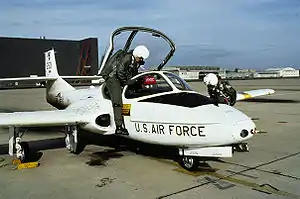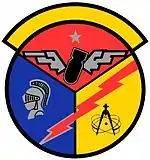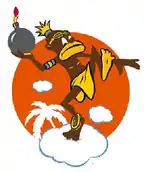449th Expeditionary Flying Training Squadron
The 449th Expeditionary Flying Training Squadron is a provisional United States Air Force unit assigned to the 322d Air Expeditionary Group.[3] In 2008, it was converted to an expeditionary unit on provisional status for activation by Air Combat Command any time after 28 October 2008. Its current status is undetermined.
449th Expeditionary Flying Training Squadron
 | |
|---|---|
 | |
| Active | 1942–1945; 1947–1949; 1973–1988 |
| Country | |
| Branch | |
| Role | Pilot Training |
| Engagements | European Theater of Operations[1] |
| Decorations | Distinguished Unit Citation Air Force Outstanding Unit Award[1] |
| Insignia | |
| 449th Expeditionary Flying Training Squadron emblem[1][note 1] |  |
| 449th Bombardment Squadron emblem[2][note 2] |  |
The squadron most recently was assigned to the 323d Flying Training Wing based at Mather Air Force Base, California.[4] It operated T-37 Tweet and T-43 Bobcat aircraft conducting flight training for members of the United States military and foreign allies.
History
World War II
Established as a Martin B-26 Marauder medium bomber squadron in mid-1942; trained under Third Air Force in Florida. Deployed to European Theater of Operations, being assigned to VIII Bomber Command 3d Bombardment Wing in England. Engaged in attacks on enemy targets in France and the Low Countries; being reassigned to IX Bomber Command in 1943 with the establishment of Ninth Air Force in England. Also supported VIII Bomber Command strategic bombardment raids in Occupied Europe and Nazi Germany, attacking enemy airfields to disrupt interceptor attacks on heavy bomber formations and destroy enemy interceptor aircraft on the ground before they could be launched.
After D-Day deployed to Advanced Landing Grounds in France and later Belgium. Provided tactical air support and bombardment of enemy strong points and military targets to disrupt resistance to Allied ground forces advancing from the French invasion beaches and the ensuing offensives on the continent; 1944–1945. Attacked enemy forces as part of the Western Allied invasion of Germany, 1945 and continued offensive tactical operations in support of ground forces until German capitulation in May 1945.
Became part of the United States Air Forces in Europe army of occupation in Germany during 1945. Demobilized in place and personnel returned to the United States in the fall of 1945; squadron inactivated as a paper unit in December 1945.
Air Force reserve
Reactivated as a reserve air training command squadron; assigned and performed advanced flight training for air cadets, 1947–1949. Inactivated due to funding restrictions.
Navigator training
Reactivated in 1972 as an Air Training Command navigator training squadron. It conducted undergraduate navigator training for USAF, United States Navy, United States Marine Corps, and United States allies from, 1973–1992.[1]
Lineage
- Constituted as the 449th Bombardment Squadron (Medium) on 19 June 1942
- Activated on 17 July 1942
- Redesignated 449th Bombardment Squadron, Medium on 20 August 1943[5]
- Inactivated on 11 December 1945
- Redesignated 449th Bombardment Squadron, Light on 13 August 1947
- Activated in the reserve on 4 October 1947
- Inactivated on 27 June 1949
- Redesignated 449th Flying Training Squadron on 28 July 1972
- Activated on 1 April 1973
- Inactivated on 31 May 1993
- Redesignated 449th Expeditionary Flying Training Squadron and converted to provisional status on 28 October 2008[6]
Assignments
- 322d Bombardment Group, 17 July 1942 – 11 December 1945
- 322d Bombardment Group, 4 October 1947 – 27 June 1949
- 323d Flying Training Wing, 1 April 1973
- 323d Operations Group, 15 December 1991 – 31 May 1993
- Air Combat Command, to activate or inactivate at any time after 28 October 2008[1]
Stations
|
|
Aircraft
- Martin B-26 Marauder (1942–1945)
- North American AT-6 Texan (1947–1949)
- Beechcraft AT-11 Kansan (1947–1949)
- Convair T-29 Flying Classroom (1973–1974)
- Cessna T-37 Tweet (1974–1992)
- Boeing T-43 Bobcat (1973–1992)[1]
References
Notes
- Explanatory notes
- Aapproved 30 May 1973. This is the former emblem of the 3538th Navigator Training Squadron placed on a disc.
- Approved 12 July 1943.
- Citations
- Robertson, Patsy (12 February 2009). "Factsheet 449 Expeditionary Flying Training Squadron (ACC)". Air Force Historical Research Agency. Retrieved 21 July 2017.
- Maurer, Combat Squadrons, pp. 554–555
- Maurer, Combat Units, pp. 202–203
- "Mather Air Force Base (Mather Field, Mather Army Aviation Support Facility)". www.militarymuseum.org. Retrieved 14 January 2021.
- See Kane, Robert B. (20 May 2011). "Factsheet 322 Air Expeditionary Group (USAFE)". Air Force Historical Research Agency. Retrieved 21 July 2017. (showing redesignation of parent group)
- Lineage in Robertson, Factsheet 449 Expeditionary Flying Training Squadron, except as noted.
- Station number in Anderson.
- Station number in Johnson
Bibliography
![]() This article incorporates public domain material from the Air Force Historical Research Agency.
This article incorporates public domain material from the Air Force Historical Research Agency.
- Maurer, Maurer, ed. (1983) [1961]. Air Force Combat Units of World War II (PDF) (reprint ed.). Washington, DC: Office of Air Force History. ISBN 0-912799-02-1. LCCN 61060979. Retrieved 17 December 2016.
- Maurer, Maurer, ed. (1982) [1969]. Combat Squadrons of the Air Force, World War II (PDF) (reprint ed.). Washington, DC: Office of Air Force History. ISBN 0-405-12194-6. LCCN 70605402. OCLC 72556. Retrieved 17 December 2016.
- Ravenstein, Charles A. (1984). Air Force Combat Wings, Lineage & Honors Histories 1947–1977. Washington, DC: Office of Air Force History. ISBN 0-912799-12-9. Retrieved 17 December 2016.
